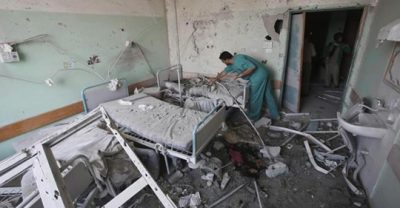BALADI NEWS
A United Nations system to prevent attacks on hospitals and other humanitarian sites in insurgent-held areas of Syria has been ignored by Russian and Syrian regime forces and marred by internal errors, a New York Times investigation has found.
The repeated bombing and shelling of these sites has led relief group leaders to openly criticize the United Nations over the system, which is meant to provide warring parties with the precise locations of humanitarian sites that under international law are exempt from attack. Some of these groups have described the system of identifying and sharing sites, known as the “humanitarian deconfliction mechanism,” as effectively useless.
A new offensive by Assad and Russian forces that began in late December has devastated what remains of several towns in northwestern Syria and caused tens of thousands of civilians to flee.
United Nations officials only recently created a unit to verify locations provided by relief groups that managed the exempt sites, some of which had been submitted incorrectly, The Times found. Such instances of misinformation give credibility to Russian criticisms that the system cannot be trusted and is vulnerable to misuse.
“The level and scale of attacks has not really decreased,” said Dr. Mufaddal Hamadeh, the president of the Syrian American Medical Society, which supports more than 40 hospitals and other sites in insurgent-held areas of northwestern Syria. “We can say categorically that in terms of accountability, in terms of deterrence, that doesn’t work.”
The Times compiled a list of 182 no-strike sites by using data provided by five relief groups and compiling public statements from others. Of those facilities, 27 were damaged by Russian or Syrian regime attacks since April. All were hospitals or clinics. Such a list is likely to represent only a small portion of the exempt sites struck during the Syrian war, now almost nine years old.
Under international law, intentionally or recklessly bombing hospitals is a war crime.
The deconfliction system works by sharing the location of humanitarian sites with Russian, Turkish and United States-led coalition forces operating in Syria, on the understanding that they will not target those sites. The system is voluntary, but relief groups said they felt intense pressure from donors and United Nations officials to participate. The groups give locations of their own choosing to the United Nations Office for the Coordination of Humanitarian Affairs, the agency that runs the system.
A document prepared by the agency warned that participation in the system “does not guarantee” the safety of the sites or their personnel. The document also stated that the United Nations would not verify information provided by participating groups. The system also does not require the Russians, Turks or Americans to acknowledge receipt of no-strike locations.
Whether such an arrangement can ever be successful in the brutal Syria conflict, where laws of war are disregarded on a daily basis, is an open question.
The forces of Bashar al-Assad of Syria, alongside their Russian allies, have acted as if the deconfliction system does not exist. Local journalists and relief groups have recorded at least 69 attacks on no-strike sites since the Russian military intervention to help Assad began in October 2015, all but a few of them most likely committed by Russian or Syrian forces.
Jan Egeland, a Norwegian diplomat who was an adviser to the United Nations on Syria from 2015 to 2018, said the United Nations had failed to impose sufficient repercussions on those responsible.
Dr. Munzer al-Khalil, the head of the Idlib Health Directorate, which oversees health care in Syria’s last opposition-held province, said many international donors would not support medical facilities unless they joined the UN’s deconfliction system.
“Therefore, we did not have much of an option,” Dr. al-Khalil said. “We paid a price by sharing the coordinates of the medical facilities with the United Nations. And what we got lately, frankly, was more bombing of medical facilities, and more precise bombing, and more destructive than before.”
Relief group leaders said that their only remaining hope was that adding their sites to the deconfliction list had left Russia and the Syrian government with no deniability — important for theoretical war crimes trials decades in the future.
“We truly believe the world has abandoned us,” Dr. al-Khalil said.
Source: Asharq al-Awsat.

